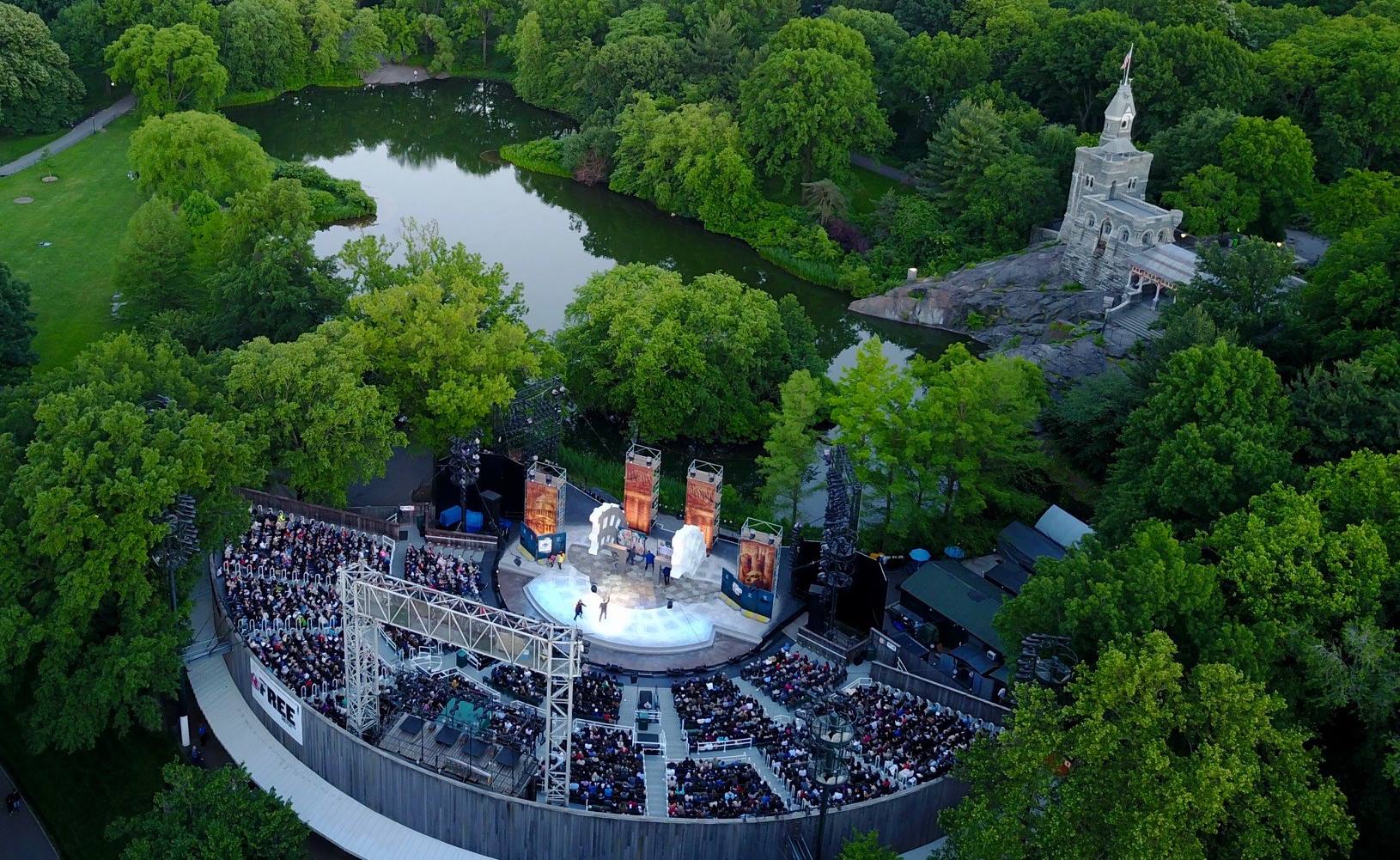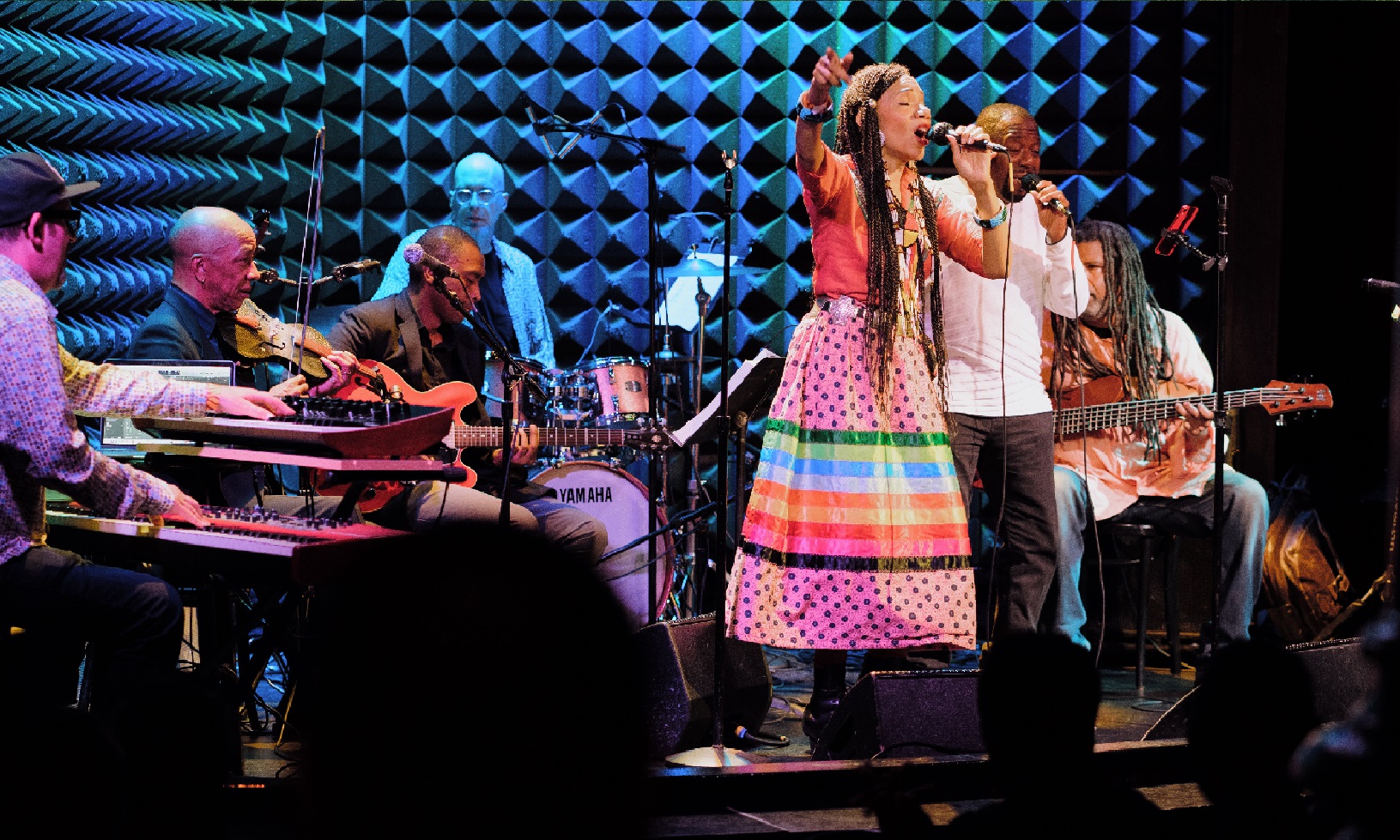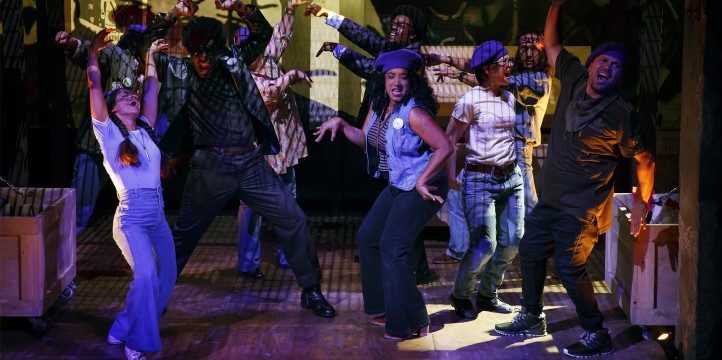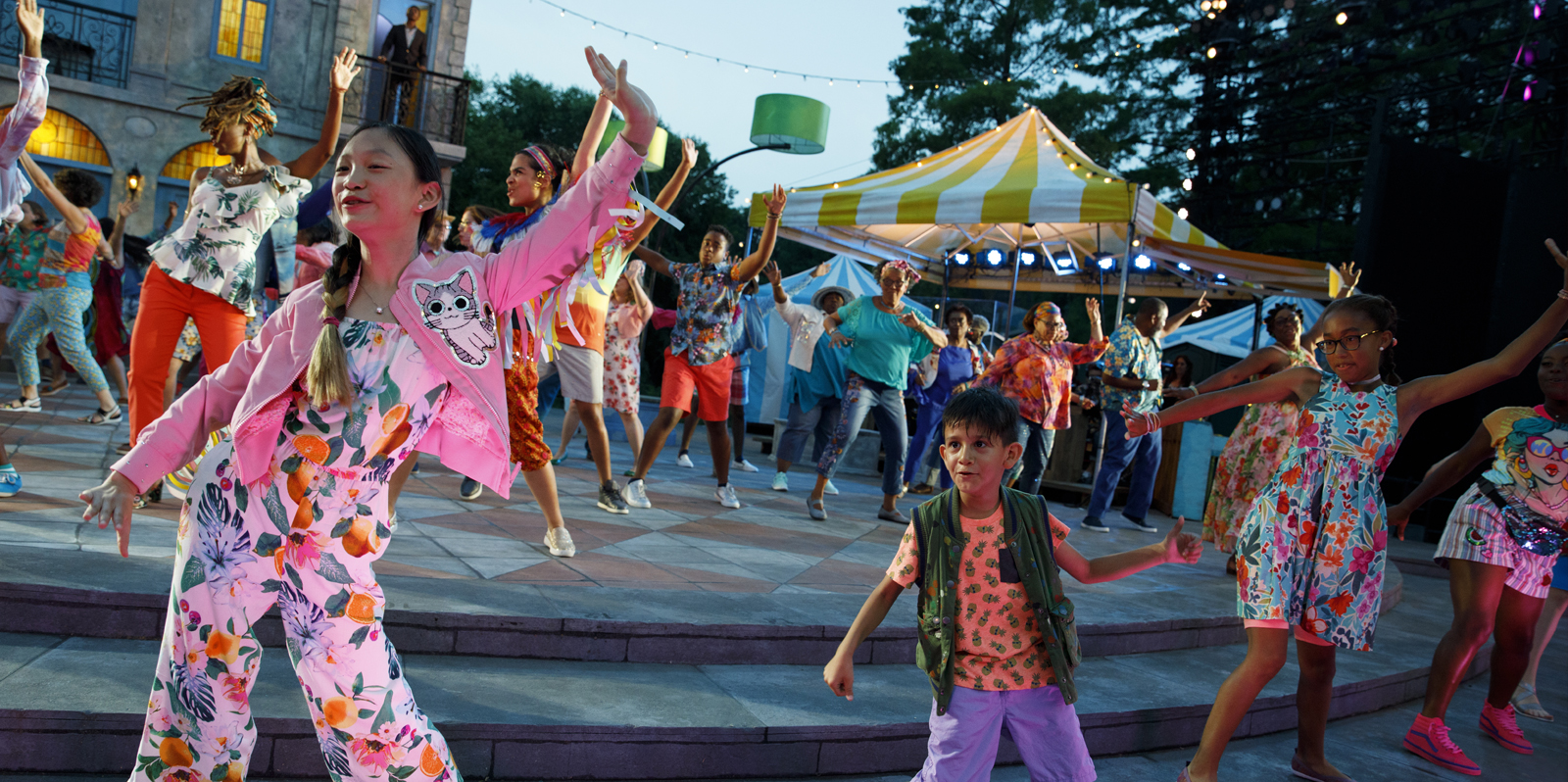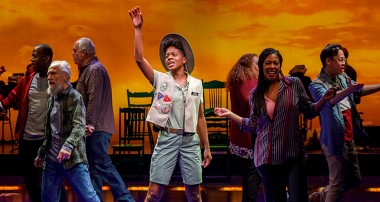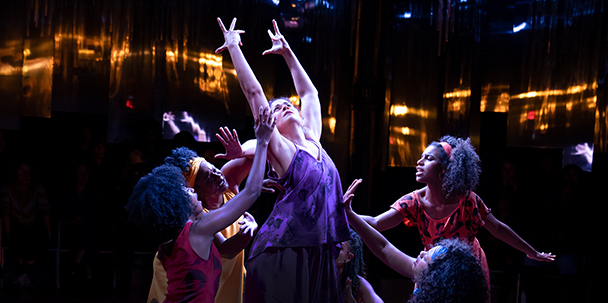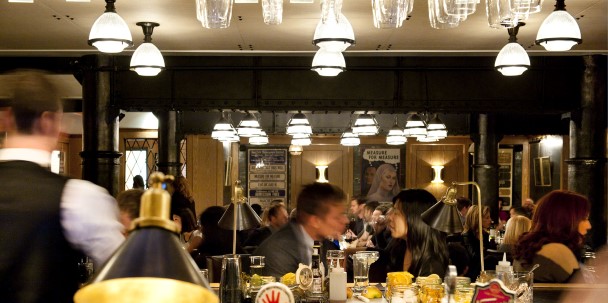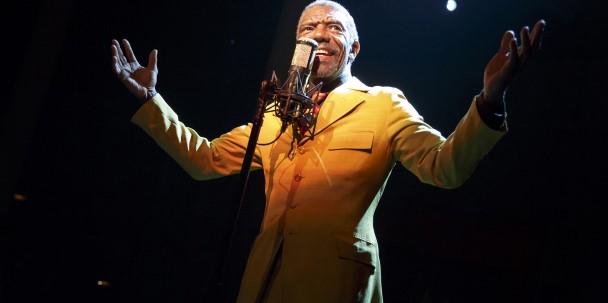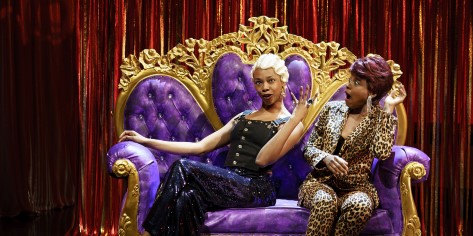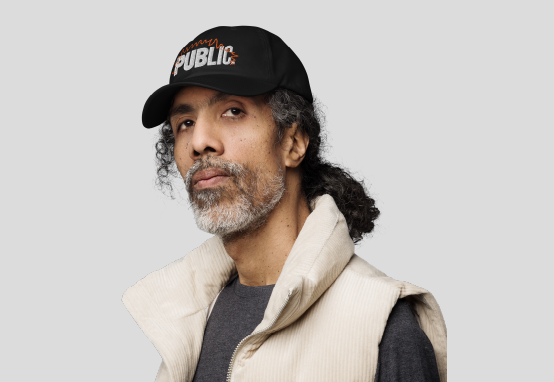Reynaldi Lindner Lolong: In 1954, Joe Papp had a brilliant idea to bring free productions of Shakespeare to the people of New York. He started on the Lower East Side, toured parks across the city, and ended up in Central Park and on Aster Place.
Drew Broussard: But that was just the beginning. What began as summertime Shakespeare in neighborhood parks has since blossomed into a year-round hub of culture, with new plays and musicals—
RLL: experimental work—
DB: live music—
RLL: international performance art—
DB: cabaret—
RLL: conversations and civic dialogue—
DB: community engagement—
RLL: and of course, Shakespeare.
DB: Through it all, the impulse has remained the same: that culture belongs to everyone, and that theatre should be of, by, and for all people. Welcome to Public Square, a podcast from The Public Theater.
DB: Hi, I’m Drew Broussard, from the artistic staff.
RLL: I’m Reynaldi Lindner Lolong from the marketing/communications team, and we are so excited to welcome you all to this first episode of Public Square. Each month we’ll be giving you a look into what we do here at The Public, through the stories of the people on- and off-stage, the people in our offices who make our work possible, and maybe even some of the people we get to share our work with.
DB: This episode we’re hitting the road with the Mobile Unit, which follows Papp’s original footsteps by touring productions of Shakespeare to sites across the five boroughs. We’ll also hear from Joe’s Pub fave and former mobile artist Michael Thurber, bring you a snippet from The Public’s archives, introduce you to one of our colleagues at the Public, Alyssa Simmons, plus, maybe a surprise or two!
RB [prerecorded]: Does anyone here have a child? Any parents out there? A kid? Great. Has anyone here ever held on to hope in a desperate situation? Yeah? Okay, hands down. Has anyone here ever been betrayed? Yeah. Thanks. Okay, cool. Me too. Has anyone here felt rage so intense that you can raise a storm? There are many hands up. Many, many. Okay, listen to this one. Go with me. Has anyone here ever asked their magical assistant to create a storm in order to cause a shipwreck of your enemies to the very same island that they banished you to? [pause] There’s always one guy.
RLL: These questions are asked of the audience at the start of each production of The Tempest, the latest production by The Public’s Mobile Unit. It’s just one of the ways that this program works to bring its audiences into the world of the story they’re about to see. We’re here with Roxanna Barrios, Associate Director of the Mobile Unit, and Laurie Woolery, director of The Tempest, to learn all about what it means to bring Shakespeare to the people of New York.
DB: Hi, you two. Thanks for taking the time to hang out with us.
RB: Wow, this is an amazing, amazing time.
LW: [at the same time] Such a privilege.
DB: Um, you’re in the middle of the tour right now, right?
RB: Yeah, we are in the middle of the tour. We actually hit midway through, I think, yesterday.
DB: So, Rox, could you give everyone a little bit of context about what the Mobile Unit is, for the people who haven’t seen a mobile production?
RB: Okay, so our founder, Joe Papp, he had this belief that theatre belonged to everyone; it shouldn’t be just for an elite party. So when he started this theater, we didn’t have a home. He did—he had a traveling theater. He had people on the back of sanitation trucks, he had sets on the back of sanitation trucks, and they would travel throughout the five boroughs of New York City and perform outside in parks. So basically, the trucks would open up into, like, rigged seating in parks and they would put on, you know, Shakespeare in the Parks for free. And this—this impulse fueled, you know, what The Public Theater is today. So when Oskar [Eustis] came to start running The Public, him and Barry Edelstein, who kinda ran Shakespeare here for a while before he went to run The Old Globe, they reinvented this program. They called it the Mobile Shakespeare Unit. And that was in 2010.
DB: It’s been a while. I didn’t realize!
RB: Yeah, it’s been a while. So, um, they kind of, you know, reinvented the idea, where we would have a tour throughout the five boroughs of New York City for free. This time we were not performing outside and we didn’t have sanitation trucks; we had two vans and sometimes a car. And this reinvention was formed off of Michelle Hensley, who is the former founding Artistic Director of Ten Thousand Things Theater. She created this form of theatre that could travel. It’s a 14x14 foot square, and there are audiences on all four sides, and actors enter in through the voms, through the four corners, and the stripped-down versions of Shakespeare plays that are in 90 minutes.
Everything has to fit into the back of a van, the actors all have to fit into a car, so the max you can have is nine of them, maybe a musician, maybe not. Oh! And also I should mention, Barry, like, limited technical elements, so we’re basically—the design of the play really focuses on the costumes and the props, and a barebone set, right? Because you can’t fit everything into the back of a car or a van. We push it every time, production will tell you! So that form has kind of carried on. We definitely have made our tweaks to it over the years, but that form really remains the same. Sooooo, that was a once-a-year program from 2010 to 2014, and with a grant from the Mellon Foundation and others, we were able to grow to two productions per year. So now we had a full season. And from there—from there we’ve grown.
DB: So, the two of you have been working as The Tempest as the most recent production.
RB: Mhmm.
DB: So I would love to know the unique challenges you’ve found or the solutions you’ve had to come up with around a 14x14 square and fitting everyone into the back of a van.
LW: Well, I love a challenge, so for me, the Mobile Unit is kind of one of those perfect creative opportunities to go ‘how imaginative can we be with finite resources?’ ‘Cause creativity is infinite. So the idea behind the simplicity of the word, the performer, and the audience, all in collaboration together—a 360° experience—is like, right up my alley; like, I love it. I come from poor theatre and I feel like that has been my training ground. So like, I can work a rehearsal block and folding chairs in my design of—[laughter] of a play, and I, uh, I love it. And I feel really incredibly powerful theatre has come out of that. I also have really amazing designers. Claire DeLiso and Wilberth Gonzalez and Michelle Rodriguez, who was our composer—we all collectively shared a vision that we wanted to create the most beautiful production that we could, especially going into correctional facilities. For me, that was my target audience.
RB: Yeah, and this brings up a really good point, which I didn’t get to in my like, uber-explanation, which is about our community partners—
LW: Right.
RB: —and um, where we go. And we travel to community centers, NYC parks; we also go to correctional facilities of all security levels in the state, local and federal capacity. We go to some homeless shelters, social service organizations, libraries—you name it, we’re everywhere. And that’s actually one of the most important parts of building these, these shows. And, you know, I lovingly called it “Creative Parameters,” because I think that sometimes, we get into a room and there’s like, all these restrictions, we have all these rules, and that’s especially true in our—with our incarcerated communities, where you can’t bring certain things into a secure facility.
LW: Well, and I also have to say that one of our goals was that, uh, we were not altering the show according to site, and that is just my own kind of personal goal, is that I did not want us to feel like we’re repackaging it. And the community gets the best, and The Public Theater gets the best. And that was really important to both Roxanna and myself, and our designers.
DB: To that end, we often bring in a professional composer for our Mobile Unit productions, and Michael Thurber has now done several of them. Michael is a Joe’s Pub favorite with his show Thurber Theater. He’s a bandleader, performer, and all-around incredible human being. And here, from the production of Twelfth Night we did a few years ago, is one of his songs, “Ven muerte”.
[song plays]
DB: That was “Ven muerte,” written by Michael Thurber, performed by Lauren Henderson from her forthcoming album, Alma obscura, produced by Michael Thurber. It’ll be out this fall. Ricardo Perez-Gonzalez did the translation, and the original lyrics are all Shakespeare’s, from Twelfth Night. It was written for the Mobile Unit production that was directed by Shaheem Ali.
RLL: Laurie, you know, in addition to directing The Tempest, you’re also the director of Public Works, and you’ve really had this track record of developing theatre for, with, and about communities, from Cornerstone to the Stone Project. How did you find your way into this work and how do you kind of find, like, the unique way to connect with such different communities?
LW: Such a great question. Thanks for asking it, because I am community, like, I come from those communities where I did not feel that I was invited to the table. I felt theatre and art in general were for the elite and privileged. I come from an immigrant, blue-collar background. I’m first-generation Latinx. So when I expressed a desire at a young age to be creative, it was like, the response I got from my mother was, “Ay no, our people, we don’t do that.” And it wasn’t about her bursting my creative bubble; she was just pragmatic, you know. And so once, um, there became a moment in my life where my father left and we lost the family home and I couldn’t find a job and all that’s rough so like, everything that I had, like the loyalty to family and everything that I had, like, fully invested in felt like it was, you know, like sand rushing out underneath my feet, this childhood desire to be an artist came through that crack. And I was like, ‘okay, I’m going for it.’
And so, community has been my grad school, and community has been my master teachers, so when I started having the opportunity to be creative, I wanted to be sure that I was telling stories that reflected my community, bringing people along for the rides, so that they could also be creative, and building a canon of work that was in conversation and partnership with community, so I’m not forcing a story that I think is good for them to hear, but more of like ‘what do we as a community need to be exploring right now?’
And that’s how Tempest was chosen, was truly out of the rage I’m feeling as a woman, as a person of color, in this world right now with the assault on immigrants and women’s rights and LGBTQ and—when you’re in partnership with Shakespeare, I wanna honor it. I don’t want to, like, slap, y’know, some vision of a director that feels false and put-upon. What do we as a community need to be exploring right now? Oh, forgiveness. How do we heal a rage and a hurt and a betrayal so enormous?
And that has been, really, the heart of the show, you know, and for me the idea of portraying Prospero from the perspective of a female felt like “Oh, I want a woman to be raging. I want a woman to be able to like, be pissed off and respond to a betrayal and an injustice.” And with Miranda, it’s not her father who is like, protecting her virginity, but it is about a mother who was raising a strong daughter, not under the gaze of the patriarch. So what happens when our young women are raised their authentic selves, to be free to be who they are? That is really the hope and the spirit behind it and I don’t know if I would have done that if I had not learned to be in collaboration with community.
DB: One of my favorite things, being in the office and seeing the tour come back everyday for the last however many years, is the community responses. And I’m—I would just love to know what the community response has been to this show.
RB: It’s funny, Laurie, when you were talking about your choice to portray Prospero as a woman, and all of these things like, none of that’s questioned on the road, and that’s not always the case with Shakespeare. People are very—they kind of want to know why we gender-swapped, why this way. But like, nothing’s really questioned, and that’s an important distinction. But we’re getting so many, just, great responses—‘Thank you for bring this to my community center’, you know, ‘Please do more of this’, you know, just really ‘Thank you for coming’ or ‘I was so moved’, especially at the correctional facilities, especially when we visit the male populations.
They’re, especially in the male-dominated spaces, the social code is such that we don’t always have a warm, engaged room, or it doesn’t seem that way. The people are kind of sitting back, arms crossed, or they’re just quieter, and they may laugh, they may, you know, enjoy, sing along when prompted, but in reality you kind of question sometimes, ‘Does this group of people hate me, or what’s going on?’ But then we get the responses back, and they are some of the most eloquent reviews that I’ve ever read, and we read them at the end of the day, while we’re having lunch before we get back on the road, and they just—it brings a lot of us to tears just because you weren’t expecting that response, and yet on pen and paper they can really just express, ‘You know—I came in not thinking that I would like this, but you changed my mind. Great work. Y’all are better than Broadway.’ Today we had a— I think it was a fourteen- or sixteen-year-old in his survey wrote, was comparing Stephano to Deadpool.
[laughter]
DB: Nice. Yes.
RB: I—yeah.
LW: That was my complete intention.
RB: Yeah, no, I figured, I figured.
Kaleda Davis: Hi, I’m Associate Call Center Manager Kaleda Davis. The original Mobile Unit paved the way for what would eventually become Free Shakespeare in the Park. To celebrate the current run, and to get ready for the summer, we went into the archives and found this excerpt from Time Magazine, August 11, 1961.
Night after night, everybody is there – cops, professors, bums, Wall Street customers’ men, out-of-work actors with Biblical haircuts, dye-blonde actresses with bright blue eyelids, sailors in summer whites, girls in their summer dresses, girls in slacks, pony-tailed skinks from Greenwich Village, and novice beards with the Penguin Classics in the hip hip pockets of their dungarees.
The crowd begins on folding chairs around a large and multi-aproned stage, then spreads out onto bleachers and grass-covered slopes. About 3500 turn up in Manhattan’s Central Park each evening to watch the New York Shakespeare Festival’s new production of A Midsummer Night’s Dream.
In six seasons, Producer Joseph Papp’s Shakespeare festival has played to more than 600,000 people, never charging admission.
“If a public library is free, why not a public theater?” asks Papp. Meeting his production costs with foundation grants and private contributions, attracting excellent young actors with little more than the promise of Shakespearean experience, Papp has managed to keep his plan alive against staggering odds – and the biggest odd of them all was former City Park Commissioner Robert Moses.
Five years ago, Papp, a Brooklyn-born trunkmaker’s son, then working as a CBS stage manager, brought his Shakespeareans out of a Lower East Side Sunday-school room and began drawing crowds to an amphitheater in Manhattan’s East River Park. He moved the following year to Central Park, settling down with apparent permanence and the blessing of Moses. But before long, a celebrated feud arose in which the commissioner tried to force Papp to charge admission, claiming that festival audiences were damaging Central Park’s crab grass. Papp took the case to court and won.
The city has lately been at pains to reverse Moses: next month, a new 2,500-seat amphitheater will be complete on the shore of Central Park’s Lake Belvedere, giving the New York Shakespeare Festival a permanent home.
RLL: Roxanna, you definitely touched on something that has always resonated with me about the Mobile Unit, is that the Mobile Unit really asks us not to make assumptions of our audience. You know, I got an email blast where the subject line was “It’s like no Shakespeare you’ve ever seen before!” And even like, that bit of marketing copy assumes so much about the people reading it: that they like Shakespeare, that they’ve seen enough to make these comparisons. What is it like having that, like, that lack of assumption in your audience?
RB: Well, I mean, I think that, I think it’s ultimately a positive thing, because you really want to make the story clear, not taking for granted that anyone has heard the story. And you know, you’d be surprised how many people come up to us and are reminded of their days in high school. We went to a new venue in Co-Op City in the Bronx yesterday—yesterday? yeah—and um … the days are long, y’all.
[laughter]
RB: And, um, this lady came up to me and she’s like, “I remember learning about The Tempest in Jamaica when I was a kid. We—I learned this in high school.” So you never really know, right? You can’t assume that people know nothing, you can’t assume people know, y’know, so I find it freeing, but that’s my producer perspective.
LW: Well, I will say, just to challenge this notion of no assumptions, is the last correctional facility that we went to. We always talk to the audience. And I walked up to a guy and I’m like, “Hey! Thank you so much for coming,” and he’s like, “Yeah, y’know, um, I’ve read Shakespeare and I’ve actually done a little Shakespeare.” And I said, “Oh, well, what’s your favorite?” And he’s like, “Hamlet’s my favorite.” I’m like, “Hamlet’s pretty great. Do you remember any of what you did?” And he’s like, “Yeah,” and he busts out this monologue, this Hamlet monologue. And I’m just like—okay then.
And afterwards, I walked up to him, I’m like, “Okay, I want your notes, I want your review, tell me what you think.” And, um, he was very positive, but, uh, him and I made a deal that when he’s out, he’s gonna come find me, gave him my name and my contact here at The Public Theater so he can join the Fortune Society and be a part of Public Works. So I’m out there recruiting on the road at the same time!
[Laughter]
RB: Listen, I’ll tell you this, I’ll tell you this, everywhere we go people want to know how to get involved, they want to know if they can volunteer, they want to know how can they get involved and then, I mean, thank God for Public Works, y’know?
LW: It’s such a great partnership, which is why, it’s just like, thank you for inviting me to direct, because it just feels like we should be doing this all the time.
RB: I agree.
LW: Sorry.
DB [at the same time]: So do we. We agree.
LW: I just gave myself a plug.
RB: Wait, why are you apologizing?
LW: I feel like this is actually the future of American theatre. It’s that theatre has to have an audience. We have to start evolving to where our stories are reflecting the communities that we live in and we also need to be having artists who are telling those stories that reflect the communities we live in, so that people can see themselves onstage, hear their stories onstage.
RB: Yeah, you know, touring Shakespeare is not the radical idea. A lot of people tour; a lot of people do tours, and the radical idea is that we can be humans in a room together, no matter where we are.
RLL: I am here with Alyssa Simmons, the Assistant GM for The Public Theater. So, Alyssa, I kind of like to think of this conversation as that meme that’s like “What People Think I Do | What I Say I Do | What I Actually Do.” You know, because general management is kind of one of those terms, you see it in the back of a Playbill or a program, but there’s a kind of a lot of kind of mystery around what that is. So do you mind just kind of talking about, you know, what exactly your job entails and how you explain that to people who might not necessarily know the theatre industry inside and out.
AS: Oh, you mean my parents.
RLL: [laughs]
AS: Clearly. Um, sure. So, general management, we do a lot of things, generally. People think that my job is to say no to things, they think my job is to constantly sit in budgets, they think my job is to be writing contracts all the time, and that’s part of it. But we really are here to support artists in all the ways that they are working in our building, in our institution, on our projects, so I spend a lot of my time understanding an artist’s want and translating that either into a budget that reflects that plan, or a contract that reflects that plan, or getting information as to “Oh you want to do this thing that is referencing somebody else’s work or is using somebody else’s work, and we respect all artists of all kinds here at The Public Theater, so, how are we going to make sure to accomplish what you want while also respecting this other artist’s intellectual property?” Um, yeah. I mean, I mean I’m a nerd on all respects. I love spreadsheets. I love bringing order to things. So if it needs a plan or it needs logistics or it needs, um, kind of figuring out how to do things, that is general management.
RLL: I like how you like, touched upon, what seems like an interesting mix of both administrative and artistic things. So on the one hand, it’s about organization and spreadsheets and budgets, but it’s also about like, listening to the artists’ intent and so on. I’m curious how you find yourself balancing those kind of two sides.
AS: So, I like to think of general management and my job as sitting at the nexus between art and business. So we are obviously beholden to the institution, we work very closely with the finance department, and so in that regard, it’s like, a lot of like, very brass-tax numbers and data and information in that regard, but also having a very clear understanding from the artists and working really hand-in-hand with our producing department, with the other artistic departments here at The Public Theater in order to make sure we are understanding what it is, this piece we’re trying to create. And so that we’re able to support that as fully as possible, realize that as fully as possible, and protect every single person and entity involved in that.
RLL: I would be remiss if I did not mention, um, that Alyssa was also my wedding planner.
AS: [laughs]
RLL: And I can’t help but feel that there are distinct parallels between wedding planning and general management.
AS: I mean, mainly because it’s all about creating a memorable event and putting together the plan in place to accomplish it.
RLL: What advice would you give someone who is interested in something like general management?
AS: Yeah, I mean, I actually slipped into general management; I didn’t really plan to go into being a GM and being on this side of theatre. Weren’t we all at some point, like, ten-year-olds belting our hearts out on stage? And so, like, you go through that, and then I went into high school and like, my high school only had performance as an opportunity so I was like “I’m gonna be a performer!” And then I got to college and realized, Oh! There’s these other things you can do that are necessary for making a piece happen, and figuring out how a production comes into being, in all aspects, in all ways, is really what I think makes me a very strong General Manager, because I’ve worked on every way you can work on a piece of theatre.
I’ve worked in every type of crew, I’ve worked in an artistic capacity, I’ve directed pieces, I have dramaturged pieces, I have designed pieces, I have general managed pieces, I have production managed pieces, I’ve performed in pieces. So it’s like, because general management kind of sits in the middle and is responsible for making sure everybody is understanding how we are accomplishing this thing, it is so important to actually understand the roles that the other team members are playing, and I think that just gives you a more comprehensive understanding of how theatre works. and we’re a collaborative art form, so understanding your teammates and how you can fully support them to be their best selves and accomplish their best work—that I think is like, the best advice I can like, give to somebody who’s interested. Also, become a GM: it’s fun.
RLL: Since our roots are in Shakespeare, we’re bringing you a bit of the Bard every month. We’re joined by Jackie Tralies of the Public Shakespeare Initiative, who’s going to take us on a speed run at random of one of Shakespeare’s works.
DB: Jackie, as quickly as you can, tell us all about … Coriolanus!
JT: So Coriolanus is a play about Caius Marcius Coriolanus. He’s a great Roman soldier. Coriolanus is actually a title that he wins after winning a huge battle sort of single-handedly. And he’s a very honest character; he says what he thinks, but he’s also kind of, he bristles at people. Like, he’s not exactly somebody you want to hang out with. Um, so anyway, he comes back to Rome and he’s lauded for his great achievements, and um, people think and his mother and some of his friends advise that he runs for political office. Right away, he struggles because part of getting the office of consul in Rome at the time is asking the people for their voices, sort of like modern-day campaigning, if you will.
But Coriolanus can’t stand it, he can’t stand trying to say things he doesn’t think or flattering anybody. He actually is elected by the people at first, but then there are these two characters, the tribunes, who at this time in Rome were these figures that were created to be more direct representatives of the people, um, so they talk to the people after they elect Coriolanus, basically reveal how contemptuous he was of the people, um, you know, he talked down to them, he basically said they were nothing. So the people actually revoke their voices, and Coriolanus actually has to leave the city with like, the best exit line ever: “There is a world elsewhere.”
He leaves the city and he goes to his enemy, Aufidius, literally the person that he fought the battle against at the beginning of the play, now he goes to him and he’s basically like, “I hate Rome and I’d like to destroy it.” And so they plot together, and he leads an assault back to Rome, to basically sack it and destroy everything, including all the people he cared about in it. Rome hears about this and they send a number of people out to the gates of the city to beg Coriolanus to give up his assault, but it’s actually not until his mother and his wife come and his mother begs on her knees that her son let the city go, that he finally gives in, and he does. But he knows that it’s going to come at a terrible cost, because his enemy, Aufidius, won’t stand for that, and actually kills him at the end of the play. It’s a wild ride!
[laughter]
JT: This is Jackie Tralies, and that was Shakespeare Speed Run.
DB: That’s our show! Thanks for listening. Thanks to Roxanna Barrios, Laurie Woolery, Alyssa Simmons, Jackie Tralies, Kaleda Davis, and Michael Thurber. The music in this episode was composed by Michael Friedman and audio engineering was by Dani Lencioni.
RLL: We’re going to close by taking a page from the Mobile Unit and ask all of you a question. You’ve got a group of friends, a van, and a 14-foot square carpet—what story do you want to share? E-mail [email protected], that’s theater with an e-r, and we’ll share some of your responses when we return next month.


